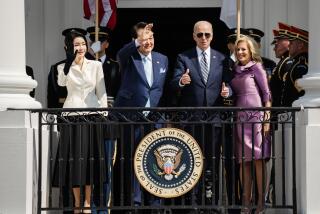Hills’ Hard Line on Trade Draws Protests in S. Korea
- Share via
SEOUL — South Korean politicians of all stripes on Wednesday blasted visiting U.S. trade chief Carla A. Hills’ hard-line demands, saying it will take further negotiations, not “Rambo-style” threats, to break the deadlock between the two nations.
The mood in economic and political circles was increasingly hostile, and some accused Washington of trying to bully Seoul into abrupt, far-reaching reforms it could not accommodate.
Chief policy-makers from the ruling and three opposition parties met with Hills, the U.S. trade representative, and told her they would back a parliamentary resolution opposing U.S. calls for South Korea to open its market to American products such as beef and telecommunications equipment.
Hills arrived here Monday on a three-day visit. Her mission was to get Seoul to lift barriers to U.S. beef, produce, services and telecommunications, and to win stronger legal protection of intellectual property rights. So far, she has failed to narrow the gap.
She has threatened to use a statutory weapon--the “Super 301” provision of the revised 1988 U.S. Trade Act--and impose harsh trade sanctions if the two sides cannot agree on contentious issues.
U.S.-South Korea trade relations have soured since South Korea started rolling up large trade surpluses with the United States a few years ago. That surplus in the first eight months this year fell to $3.04 billion from $5.4 billion in the first eight months of 1988.
Seoul officials have said they would consider Hills’ proposal that restrictions on imports of high-quality beef be lifted first, but they remained adamant that a full opening of South Korea’s markets in the near future was impossible.
South Korea imports beef on a quota system. Hills warned that if Seoul did not make satisfactory progress on the beef issue, she would slap duties of up to 100% on certain South Korean imports, starting in mid-November.
A similar threat was made on telecommunications. Seoul was given until next February to resolve the issue, and bilateral talks are to begin at the end of this month.
Some South Korean officials said that Hills pushed too hard.
Representative Kim Young Jin of the opposition Party for Peace and Democracy said in a newspaper interview: “The United States is applying Rambo-style trade pressure. How can it talk of partnership with Korea?”
In another joint statement, the four parties’ policy-makers told Hills: “Keeping in mind the state of our economy, U.S. demands to open our markets fully to beef, telecommunications and farming goods are highly unreasonable.
“We urge our American counterparts to drop such extreme measures as threats, and engage in dialogue to iron out our differences.”
The media here also have been critical of Hills’ unrelenting, hard-bargaining stance.
“We must not expedite the arrival of Christmas (by giving in to U.S. pressures) and become a foolhardy turkey,” said an editorial in the independent daily Chosun Ilbo.
“As if their annual $100-billion trade deficit was our fault, the United States has forced up our currency, and now our economy is bogged down in the worst crisis we have known since recent years of high growth,” it said.
“If (the U.S. side) is unwilling to compromise in these bilateral meetings, then we must let them return home empty-handed,” the daily said.
Trade Ministry officials said the four policy-makers told Hills that phasing out restrictions on 236 agricultural goods, since July, already has jeopardized the livelihood of some debt-ridden farmers.
The farm lobby, representing roughly 20% of South Korea’s population, wields strong political clout.
Under earlier U.S pressure, Seoul agreed to lift import barriers on the 236 items gradually, with full opening scheduled for 1991. It still limits imports of 265 agricultural products, including beef, rice, oranges and grapes.
More to Read
Sign up for Essential California
The most important California stories and recommendations in your inbox every morning.
You may occasionally receive promotional content from the Los Angeles Times.










